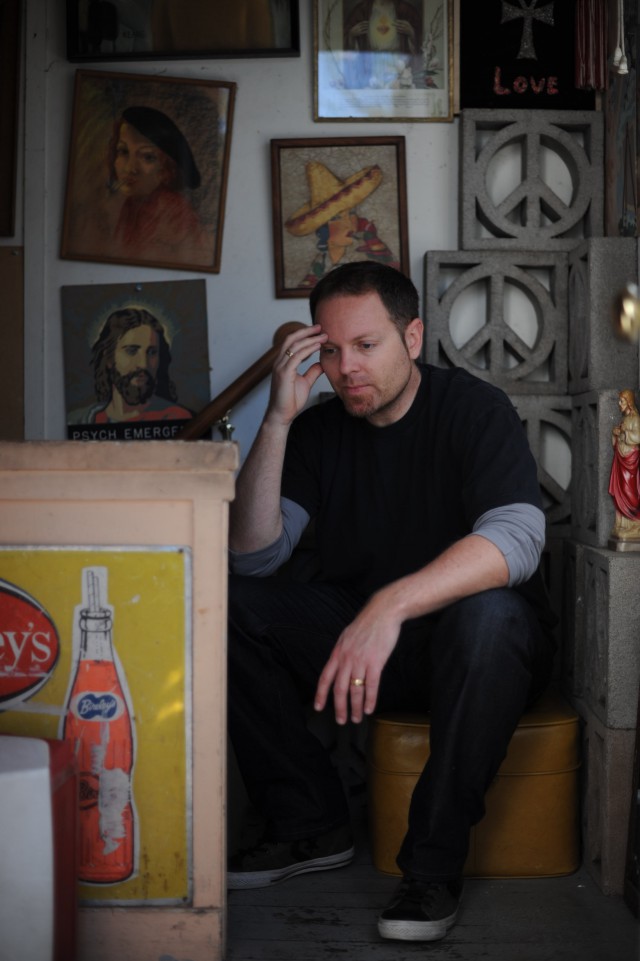
Josh Davis, better known by his elusive moniker, DJ Shadow, has enjoyed a kind of staying power few artists experience. A San Francisco DJ and producer with a famous affinity for record collecting, he forever influenced the world of hip-hop in 1996 with Endtroducing, his debut full-length album. Heralded as the first record constructed entirely out of samples, its expert craftsmanship and tastefully hazed approach to funk, soul, jazz and various obscurities stunned critics and fans, laying a groundwork for the trip hop, instrumental and experimental hip-hop sounds that East Coast producers and DJs still tinker with today.
However, despite this early acclaim, much of Davis’ career has gone relatively unnoticed. Endtroducing fittingly marked the beginning and end of that particular jaunt, and since then, he has built a reputation on eluding expectations. His career is marked by experimentation, which can be heard in melodic strings and disco found on The Private Press or mainstream rap on critically divisive The Outsider. Even his long list of collaborators, which includes names like Thom Yorke, Q-Tip and Cut Chemist, is always growing.
But for someone who has continually reinvented himself as an artist for more than a decade, Davis has always maintained a sense of mystery about himself as a person. That doesn’t mean he isn’t honest; on the contrary, he freely and courteously dispenses his views on just about any subject. But when it comes to public perception, especially with the advent of social media, Davis is wary.
“I know that that’s a different sentiment than the way most people do things now,” Davis says. “Now [musicians] want their Twitter to pop, so they get a team of people and invent content to make it seem like they’re super out there and up on things and opinionated. But whenever I sit down and feel like I want to vent on Twitter, I end up just deleting it because if I were following me, I wouldn’t care about that stuff. So why would anybody else?”
This skepticism about technology is something that’s become central to Davis as an artist. In fact, his 2011 release The Less You Know, The Better dealt with the threat he feels technology poses to music. He’s also planted his singles in record stores to give fans the tangible thrill of discovering music, as well as con ceived a marketing campaign to combat the Internet’s culture of negativity. But in 2010, people especially took notice when he came out on his website staunchly against the practice of free music downloads. Though Davis has since started offering freebies of his own music and even worked with BitTorrent, he says that coming to terms with that reality was not easy.
“I thought that [free downloads] sent out a weird message about the value of music in general at the time. But then you feel like, ‘So, I’ve said what I wanted to say on that subject.’ Instead of fight a losing battle you just go, ‘OK, my own thought processes are evolving,’” Davis says. “But that’s another reason why when you voice an opinion on a subject on social media, it sort of becomes frozen in time or it defines who you are permanently. As human beings we’re always changing our minds about things, but sometimes when you’re under the microscope as a musician, it creates kind of a chilling effect on really sharing your opinions.”
If the music he’s made since Endtroducing is any indicator, the last thing Davis wants is to be put in a box. But his releases since that fateful album have often been met with lukewarm reviews. Davis says he never intended to recreate Endtroducing, but he did have misconceptions about how people would respond to his work.
“It may sound strange, but I actually used to think that people should like everything I make because I felt that invested in what I was doing. I felt like I was challenging my fan base at times, and I wanted them to follow everything I did,” Davis says. “But then I just started to think that that’s kind of unrealistic. Once I came to that realization, it made being adventurous and doing different things and really following my own path a little bit easier.”
At his upcoming All Basses Covered show at Boulder Theater, he’ll flex his DJ muscles to not only spin some original material, but also mix together funk and contemporary tracks, old and new songs, and anything he feels like digging out of his music library. Davis says he hasn’t been able to DJ like this since the late ’90s.
“For a while, I felt a big responsibility to put together a live show in the way that a band would, but suddenly 13 years went by and I realized I really should allow myself to just DJ again because I’ve been missing it,” Davis says. “I think knowing when to switch it up really has to do with, ‘Am I invested in what I’m doing?’ But at the same time I can sort of feel the need for a change and I like to listen to those little signals.”
While there’s no concrete plans beyond finishing out his tour, Davis knows he’s the kind of artist who is always searching for something new and unexpected. He just hopes that, in time, his audience will understand that his perspective will never stop evolving.
“Once people allow that for an artist, it all falls into place and makes sense for people,” Davis says. “I don’t know whether that’s going to happen or has happened, but, as an artist, you have to have faith that it will.”
DJ Shadow plays the Boulder Theater on Saturday, Sept. 28. Salva opens. Show starts at 9 p.m. Tickets are $27.50 in advance, $30 day of show. 2032 14th St., Boulder, 303-786-7030.
Respond: [email protected]














